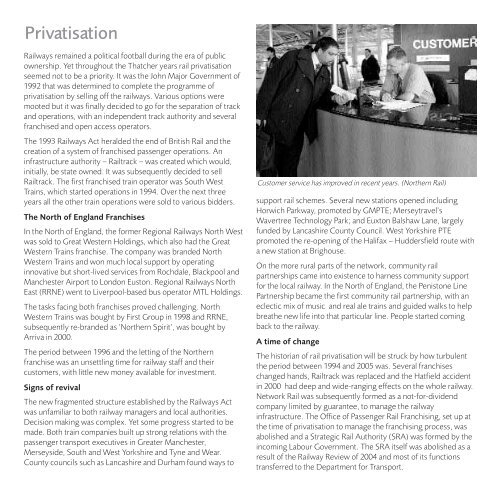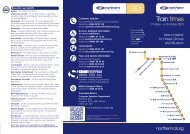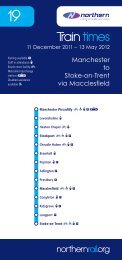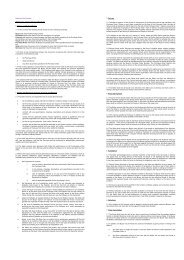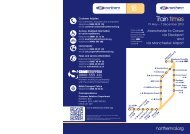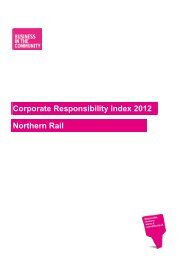Northern Heritage - Northern Rail
Northern Heritage - Northern Rail
Northern Heritage - Northern Rail
- No tags were found...
You also want an ePaper? Increase the reach of your titles
YUMPU automatically turns print PDFs into web optimized ePapers that Google loves.
Privatisation<strong>Rail</strong>ways remained a political football during the era of publicownership. Yet throughout the Thatcher years rail privatisationseemed not to be a priority. It was the John Major Government of1992 that was determined to complete the programme ofprivatisation by selling off the railways. Various options weremooted but it was finally decided to go for the separation of trackand operations, with an independent track authority and severalfranchised and open access operators.The 1993 <strong>Rail</strong>ways Act heralded the end of British <strong>Rail</strong> and thecreation of a system of franchised passenger operations. Aninfrastructure authority – <strong>Rail</strong>track – was created which would,initially, be state owned. It was subsequently decided to sell<strong>Rail</strong>track. The first franchised train operator was South WestTrains, which started operations in 1994. Over the next threeyears all the other train operations were sold to various bidders.The North of England FranchisesIn the North of England, the former Regional <strong>Rail</strong>ways North Westwas sold to Great Western Holdings, which also had the GreatWestern Trains franchise. The company was branded NorthWestern Trains and won much local support by operatinginnovative but short-lived services from Rochdale, Blackpool andManchester Airport to London Euston. Regional <strong>Rail</strong>ways NorthEast (RRNE) went to Liverpool-based bus operator MTL Holdings.The tasks facing both franchises proved challenging. NorthWestern Trains was bought by First Group in 1998 and RRNE,subsequently re-branded as ‘<strong>Northern</strong> Spirit’, was bought byArriva in 2000.The period between 1996 and the letting of the <strong>Northern</strong>franchise was an unsettling time for railway staff and theircustomers, with little new money available for investment.Signs of revivalThe new fragmented structure established by the <strong>Rail</strong>ways Actwas unfamiliar to both railway managers and local authorities.Decision making was complex. Yet some progress started to bemade. Both train companies built up strong relations with thepassenger transport executives in Greater Manchester,Merseyside, South and West Yorkshire and Tyne and Wear.County councils such as Lancashire and Durham found ways toCustomer service has improved in recent years. (<strong>Northern</strong> <strong>Rail</strong>)support rail schemes. Several new stations opened includingHorwich Parkway, promoted by GMPTE; Merseytravel’sWavertree Technology Park; and Euxton Balshaw Lane, largelyfunded by Lancashire County Council. West Yorkshire PTEpromoted the re-opening of the Halifax – Huddersfield route witha new station at Brighouse.On the more rural parts of the network, community railpartnerships came into existence to harness community supportfor the local railway. In the North of England, the Penistone LinePartnership became the first community rail partnership, with aneclectic mix of music and real ale trains and guided walks to helpbreathe new life into that particular line. People started comingback to the railway.A time of changeThe historian of rail privatisation will be struck by how turbulentthe period between 1994 and 2005 was. Several franchiseschanged hands, <strong>Rail</strong>track was replaced and the Hatfield accidentin 2000 had deep and wide-ranging effects on the whole railway.Network <strong>Rail</strong> was subsequently formed as a not-for-dividendcompany limited by guarantee, to manage the railwayinfrastructure. The Office of Passenger <strong>Rail</strong> Franchising, set up atthe time of privatisation to manage the franchising process, wasabolished and a Strategic <strong>Rail</strong> Authority (SRA) was formed by theincoming Labour Government. The SRA itself was abolished as aresult of the <strong>Rail</strong>way Review of 2004 and most of its functionstransferred to the Department for Transport.


